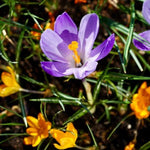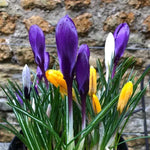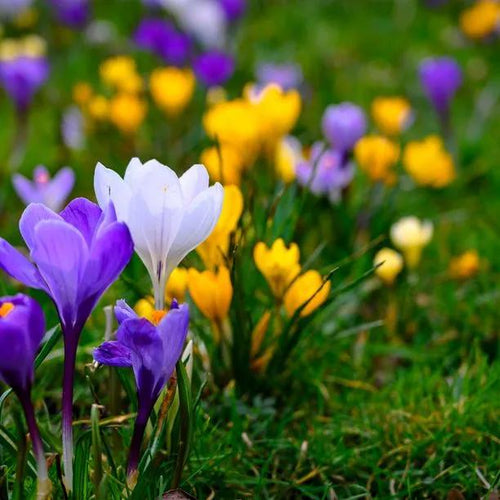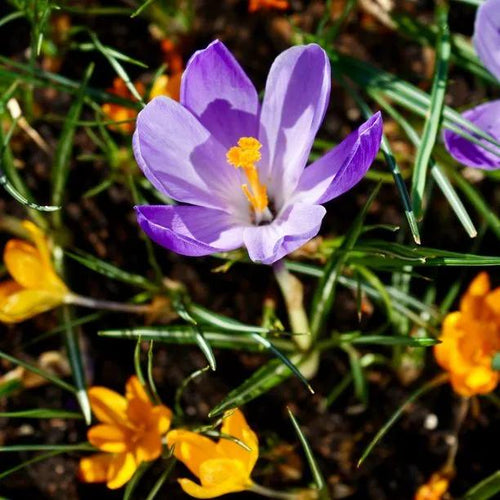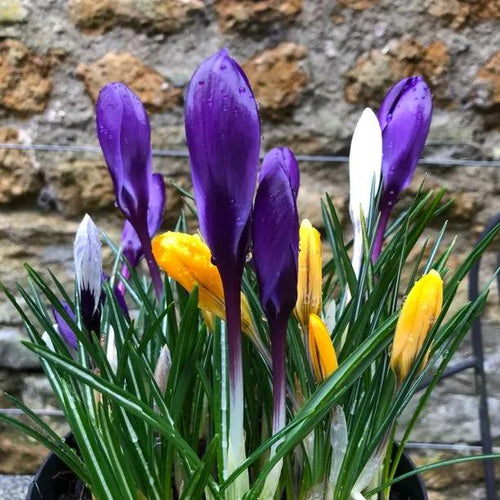Mixed Crocus Bulbs
Mixed crocus bulbs planted in autumn are a really easy way to ensure a bright and colourful start to your early spring garden next year
This collection is made up of a range of varieties of Crocus vernus one of the larger crocus species standing about 4-5 inches tall. These are also among the hardiest members of the crocus family bringing much longed for splashes of colour to your garden year after year, at a time when few other flowers dare to venture out.
Here we have a mixed collection of our five favourite varieties, chosen for their glorious colours which, together, will provide a stunning start to your early spring garden. They are:
Crocus Remembrance
A lovely violet blue in colour, Remembrance provides a subtle backdrop to the brightness of the golden Yellow Mammoth variety.
Crocus Flower Record
The purple-blue flowers have a slight silvery sheen adding a subtle touch to this collection's colour palette.
Crocus Yellow Mammoth
One of the molst 'golden' crocuses, Yellow Mammoth is the perfect antidote to the long dark days of winter and brings a burst of sunshine to the mix.
Crocus Joan of Arc
The sophisticated pure white flowers with their yellow stigma add a fresh and beautiful brightness, signalling that spring is certainly on its way.
Crocus Pickwick
With its ridiculously pretty, delicately striped white and purple flowers, Pickwick completes this stunning collection, which will lift even the heaviest of winter blues!
Planting Instructions
Plant in autumn in well-drained soil, in full or partly shaded areas. Be sure to add a generous helping of grit to soil before planting if drainage is doubtful.
Plant the bulbs, or corms as they're called, about 3-4" deep and 3-4" apart. In the winter is dry, remember the corms are growing underground and will need water.
During the summer season, they'll happily lie dormant in drier soil conditions. Flowers from March to April, but in milder winters, blooming can start as early as February.
For a natural look when planting in lawns or grassy areas, simply throw handfuls of the bulbs onto the ground and plant them where they land. A warning here, to lawn mowing enthusiasts once blooming has finished, it's vital NOT to cut the grass for six weeks afterwards, in order to encourage self-seeding. Lift the corms every four to five years to divide and replant.
Bees absolutely love Crocuses, and being one of the first flowers of spring, they provide an invaluable food source for bees and other insects.
History & Trivia
The first records of Crocus cultivation came from the island of Crete in Roman times. It wasn't until the 1560s that the first Crocus was seen in the Netherlands, when Crocus corms were brought back from Constantinople by the Holy Roman Emperor's ambassador to the Sublime Porte.
Crocuses are members of the Iris (Iridaceae) family and the word Crocus comes from the Greek name 'krokos' meaning saffron. However, there is only one species of Crocus that provides Saffron, the Crocus Sativus, which flowers in the autumn with large purple flowers and orange stigmas. Adding the stigmas, or saffron, to fish dishes is a must try, it's delicious!

 Secure, One-Tap Checkout
Secure, One-Tap Checkout
 Hand Picked, Delivered to Your Door!
Hand Picked, Delivered to Your Door! 1 Year Bareroot Guarantee
1 Year Bareroot Guarantee
